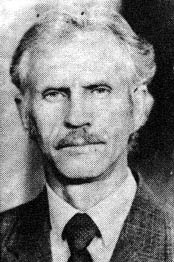 Blinding flashes and the noise in the work-shop through which voices could not be heard. Vytautas Koncevičius worked in such an environment for more that 20 years.
Blinding flashes and the noise in the work-shop through which voices could not be heard. Vytautas Koncevičius worked in such an environment for more that 20 years.
- We weren't surprised that Vytautas rushed to the precipice of the television tower. After working here, neither tank searchlights nor shots would make a big impression on you, - joke Vytautas Koncevičius' team-workers sadly. Jonas Kemzūra and Jonas Valionis worked on the team that Vytautas led for five years, while Jonas Krasadomskis, the youngest, had hardly worked there for two years. But the men became true friends, and their small team was the best in the Kėdainiai department of Jonava engineering plant.
-Vytautas used to understand the task from half a word, and he read work drawings as well as an engineer, - says department head Vincas Rozenbergas. - He always rushed over to help anybody who needed his advice, his skillful hands, or a few roubles until pay-day. Maybe it was his nature, or maybe it was the long years of working in a noisy shop that made it his habit to speak. quietly and not much. Today, when Vytautas is gone, his co-workers recollect various trifles that have suddenly become dear memories.
-If he had to explain something, he did it clearly and understandably. He had a habit of saying „yes" in Russian instead of in Lithuanian. This was left since his youth, which he spent in Siberia. You would ask him something and he'd say: „Da, da, just a minute..." He loved his mother very much. We used to hear him saying: J have to let her know that I'll be coming home late so she doesn't get nervous. My mother's not feeling well. I'm going to the city to get some medicine..."
For 20 years he lived alone with his mother in a small 9x9 m. hostel room. Maybe that's why he didn't have a family. And he never sobbed or complained of anything. Teklė Koncevičienė, though 80 years old, is amazingly agile. Her mind is so sharp that you couldn't call her a little old woman. Yet where does she get her strength, when she is left all alone, to care for other people, to talk with them, and to help them as much as she can?
- Life has tempered. I shed all of my tears in exile, in Siberia. My husband died there -1 don't even know where his grave is. With my own hands, I dug a grave for my 6-year-old son there, - tells Teklė Koncevičienė. Like she is surprised, she adds: Here, I'm breathing, living, and I'm burying my second son. Everything that was most dear to me I have given to Lithuania.
Teklė Koncevičenė and her two children were exiled in 1945. She returned from far Ust Pechiorsk only with Vytautas, who was already a teenager. Their life was difficult. A deportee, Vytautas could not get a job. He had to leave for Siberia again. Yet homesickness brought him back.
- A few years ago we finally got a flat. It seemed like we could live a normal life... I had hope the whole time the doctors were trying to save him from the bullet wounds. He suffered for more than a month, but it wasn't his fate, - the mother's voice cracks...
She folds her hands and stiffens up. Her face is sad but serene. An enlarged photograph of her son gazes from the wall. An echo of the shots of January 13th that had undermined her son to death.
Lithuania, 1991.01.13 : documents, testimonies, comments. - Vilnius : State Publishing Center, 1992, p. 65.
